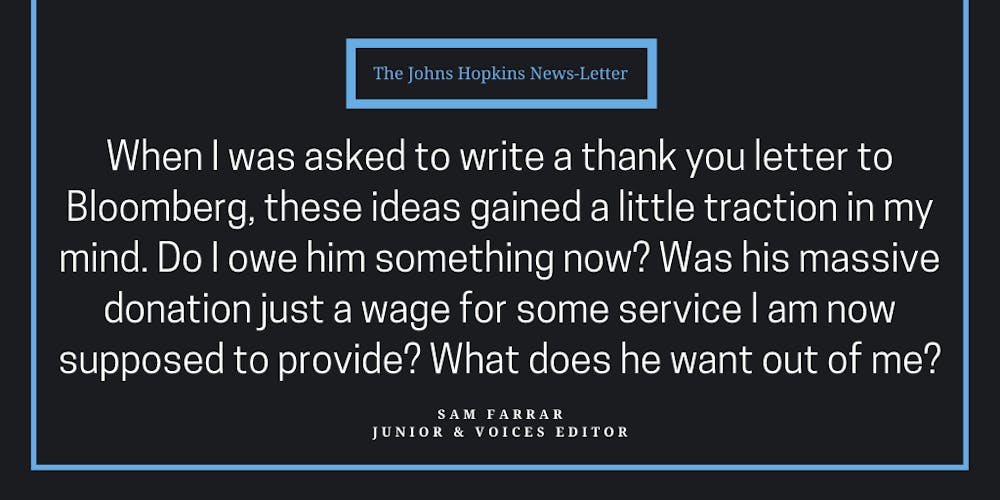This time last year, Michael Bloomberg announced that he would donate a historic $1.8 billion to the University, to be used exclusively for undergraduate financial aid and related services.
Earlier this semester an administrator told myself and a group of other first-generation and limited-income (FLI) students that we should consider writing Bloomberg a thank you letter for his gift to the University.
It is true that Bloomberg did something great for the University, but when I saw everyone else squirm in their seats, I could tell I wasn’t the only who was uncomfortable with this request.
While we all sort of grumbled the request away, I think it is important to identify why this request made us all uncomfortable, and why it can be so problematic. I want to clarify that I’m not speaking on behalf of all FLI students, but this has been my experience.
Imposter syndrome is something that people talk about constantly at Hopkins. Students, faculty and administrators alike all agree that it is as much a problem on our campus as it is on any other in the country. It seems to be the root of all of the largest problems we see at Hopkins, from the high rate of reported depression, to the toxic work culture and collective suffering that we have all become accustomed to.
However, these problems aren’t equally distributed. Of course, their impact varies from individual to individual, but certain groups are also at a higher risk. One of these groups is FLI students.
This makes sense. A lot of the time, we come from less elite high schools and with fewer experiences under our belts. It can feel like you’re starting behind the curve. It feels like you got in to make the University look friendlier to FLI students rather than because of your actual ability.
At its worst, it can feel like you owe someone or something. I can’t support myself here, so someone else does it.
The personification of the Hopkins endowment wouldn’t put these resources into me if they weren’t looking to get something out of it. Am I beholden to their wishes? Should I pursue the path that I want, or should I just help them raise those FLI-friendly stats on their admissions website? That’s what they want out of me, right?
This kind of thinking is most severe for underclassmen. As you spend more time at Hopkins and carve out a space for yourself, you start to realize that these ideas are wrong and unhealthy. But that takes work; it is not easy to convince yourself that you belong here, no matter who you are.
But when I was asked to write a thank you letter to Bloomberg, these ideas gained a little traction in my mind. Do I owe him something now? Was his massive donation just a wage for some service I am now supposed to provide? What does he want out of me?
This is just a summary of the larger discourse around Bloomberg’s donation on campus. I’m constantly told how what he did is amazing and how gracious I should be. I’m told to look at all the new resources and programs he has given me. But that “given” is always spoken with an asterisk. Behind this word is an expectation of reciprocity.
I want to say that I am extremely grateful for Bloomberg’s donation. The new resources that the donation provide for are still being built, but it is already easy to see their impact.
This summer, I led a new pre-orientation program for FLI students. I’ve talked to new case managers at Student Outreach and Support who were hired with Bloomberg funds. I’m constantly surprised by how much more programming the Center for Student Success is able to provide for FLI students than it used to.
However, I cannot express this gratitude without saying that neither I nor any other FLI student on campus owes Bloomberg anything. I want to say that I can take advantage of the new opportunities his donation provides while still retaining the personal autonomy to use my education and experience to pursue my own goals, and mine alone.
The thing is, if Bloomberg truly made that donation because of his concern for the experience of FLI students, he wouldn’t want some recognition of indebtedness for his action. He would be perfectly content with watching the impact his money had on Hopkins.
Why is this important now? Recently, Bloomberg suggested that he was considering entering the 2020 Democratic presidential candidacy race. It is important that the suggestions of obligation and respect towards Bloomberg that I have encountered on campus do not end up translating into similar suggestions of political obedience.
Now, I doubt I’ll ever hear someone flat out tell me that I should vote for Bloomberg, but those conclusions are not hard to reach based on the discourse already present around the donation. Furthermore, I doubt that many, if any, Hopkins employees actually believe that automatic political support is warranted. They probably don’t mean to put that subtext of reciprocity behind every cheer of gratitude towards Bloomberg.
That doesn’t take away from the fact that they are contributing to this insecurity. I do not believe the facilitators of Bloomberg-funded programs are doing enough to dispel the anxieties of having to “repay” Bloomberg with our action. You can say these anxieties are irrational, but that doesn’t make them any less real.
Sam Farrar is a junior majoring in Political Science and minoring in History from Brevard, North Carolina. He is on the Eboard for I’m First and is the Voices Editor of The News-Letter.





